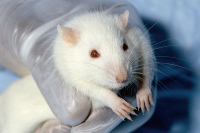
From The Scientist [30th July 2009]
In the first set of tests, rats were trained to press a lever to receive a reward (either food pellets or sucrose). After two weeks of training, they were given full access to the reward and allowed to consume as much as they desired. When presented with the lever again, control animals stopped pressing the lever, but stressed animals didn't. If you get the dessert for free, Costa said, there's no need to work for it. 'That's what control animals do,' but stressed animals work anyway.
In a second set of experiments, rats were trained to press one lever for pellets and the other for sucrose. Then, one of these two rewards was provided for free -- i.e., without a lever press. When the rats were given a choice of levers, control animals rightly pressed the lever that still required pressing to receive the reward, while stressed animals showed no preference between the two options.
'It's not that they are stupid and don't understand that there is a difference,' Costa said. 'It's just that when given a choice, they will do the automatic thing.' In fact, he said, these stress-induced changes seem almost adaptive. ' When we are under chronic stress, it could be advantageous to use habitual strategies because [it reduces] the amount of cognitive resources that you need.' Of course, when circumstances change, such a strategy can backfire.

No comments:
Post a Comment